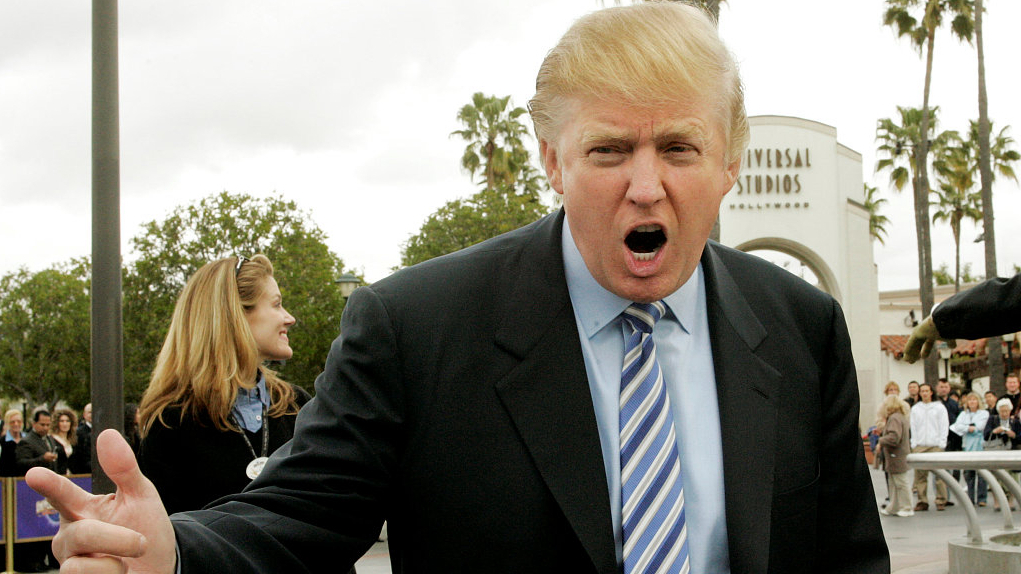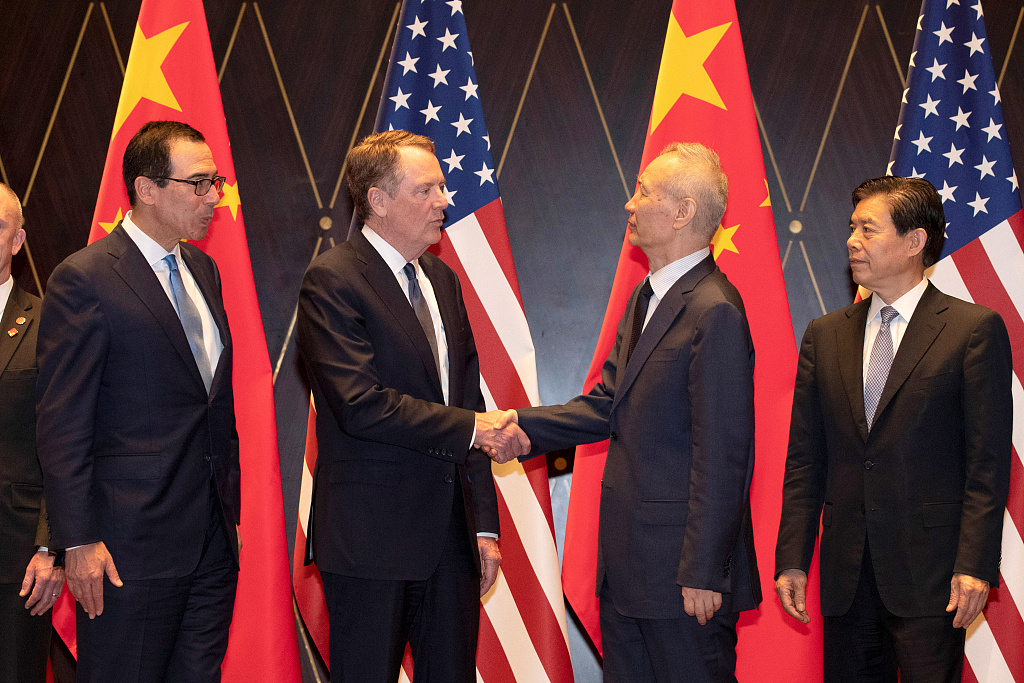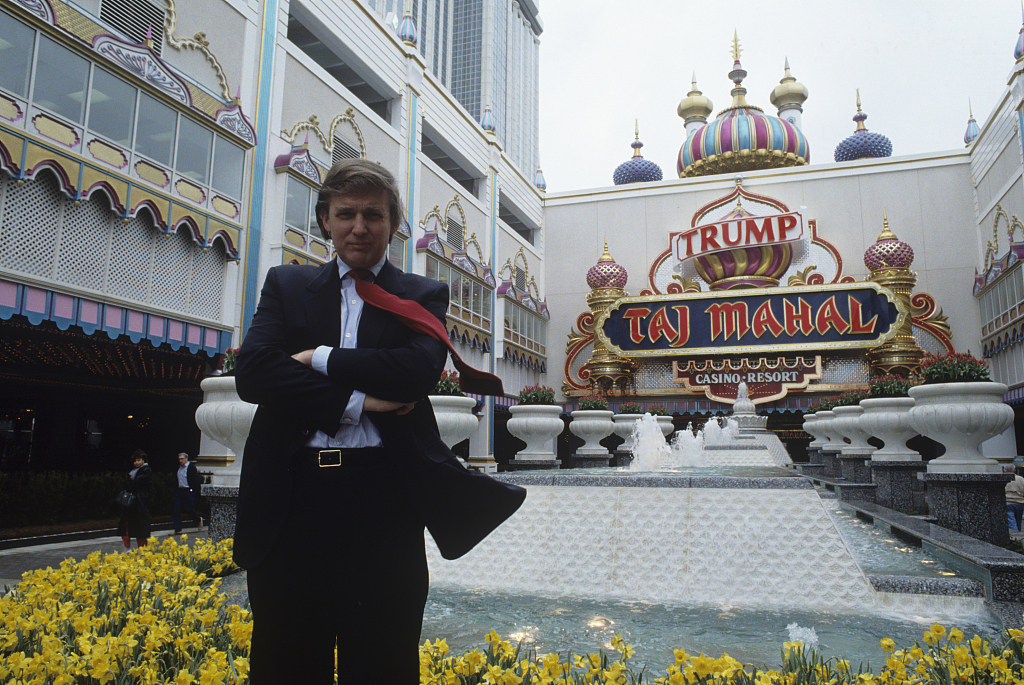

Editor's note: The article is based on the interviews with Wu Xinbo, director of Fudan University's Center for American Studies, and Wang Yong, professor at the School of International Studies at Peking University. The article reflects the experts' opinions, and not necessarily the views of CGTN.
U.S. President Donald Trump announced to slap a new 10 percent tariff on 300 billion U.S. dollars of Chinese imports on September 1. This, combined with the 25 percent levy that the White House already imposed on 250 billion U.S. dollars in Chinese goods, will cover nearly everything China exports to the United States.
The move immediately invited complaints from the American public. Four large retail trade groups jointly warned that the fresh tariffs will raise prices for everyday items and jeopardize employment. "We are disappointed the administration is doubling-down on a flawed tariff strategy that is already slowing U.S. economic growth, creating uncertainty and discouraging investment," Senior Vice President for Government Relations David French told Reuters.

U.S. Trade Representative Robert Lighthizer (L) shakes hands with Chinese Vice Premier Liu He (R), Shanghai, China, July 31, 2019. /VCG Photo
As a businessman-turned-president, Trump is fully aware of the adverse effects tariffs will exert on the American economy. But whether China will purchase American agricultural products, or in other words, whether Trump could reach a deal to woo farmers, is what the president cares about the most, Wu Xinbo, director of Fudan University's Center for American Studies, told CGTN.
Wang Yong, a professor at the School of International Studies at Peking University, agreed that Trump's capriciousness on tariff is closely connected to Washington's domestic politics. With the clock ticking toward the 2020 general election, Trump is straining every nerve to lobby for more votes.
The fundamental deal, if reached, would be a huge boon for Trump's election campaign. China's purchase of American agricultural products, in particular, would be an effective tool for Trump to draw farmers who voted for Trump in 2016 back into his chariot in 2020.
Therefore, the master of the "art of the deal" has again resorted to his old trick, vainly hoping that tariff threats would overwhelm Beijing into making more concessions in the next round of trade talks in early September. A deal that would satisfy voters is what Trump pursues. For this end, Trump is exercising his campaign of maximum pressure on China at the risk of the American economy.

Opening of the Trump Taj Mahal Casino in Atlantic City, U.S., April, 1990. /VCG Photo
As for the economy, Trump has, several times, pressured the Federal Reserve to cut interest rates, hoping to minimize the negative effects of tariffs. But apparently, the president has overestimated the resilience of the American economy. Immediately after the threat, the S&P 500 dropped by 1.1 percent. The oil prices saw an instant plummet as well.
Trump's "art of the deal" is backfiring, Wang warned. To begin with, the Chinese economy is resilient enough to withstand the tariffs. Beijing will never sacrifice its core interests in exchange for a deal. Moreover, Trump's capriciousness will only irritate China and the international community, making a deal even more difficult.
Most importantly, as Wu stressed, the White House is much more motivated, both economically and politically, than Beijing in reaching a fundamental trade deal. It is worth noting that despite tariff threats, Trump has, on many international occasions, called President Xi his "friend," hoping that this would facilitate the trade negotiations.
Moreover, the U.S. side always links trade talks with the alleged fentanyl sale. The fentanyl issue has nothing to do with the trade imbalance between the U.S. and China, but Trump has repeatedly urged Beijing to list its endeavors in eliminating the alleged shipment of this synthetic opioid to the United States in the possible deal.
Wang believed that it is evidence that the Trump administration is eager to sell the potential deal as a U.S. victory over China to court the American public. Fentanyl control has long been a matter of concern in the United States, and Trump's emphasis on the issue demonstrates his anxiety of using the deal to win more public support.
China is sincere in trade talks and hopes to settle the trade friction at the earliest date. But Washington should never underestimate China's determination in safeguarding its core interests. Instead of provoking Beijing with new tariffs, the Trump administration should abandon the so-called "art of the deal" and show its sincerity in talks. This is the only way out.
(If you want to contribute and have specific expertise, please contact us at opinions@cgtn.com.)

Copyright © 2018 CGTN. Beijing ICP prepared NO.16065310-3
Copyright © 2018 CGTN. Beijing ICP prepared NO.16065310-3